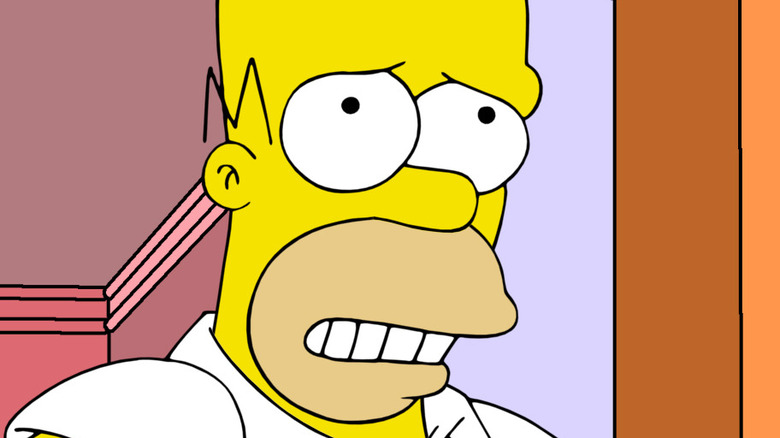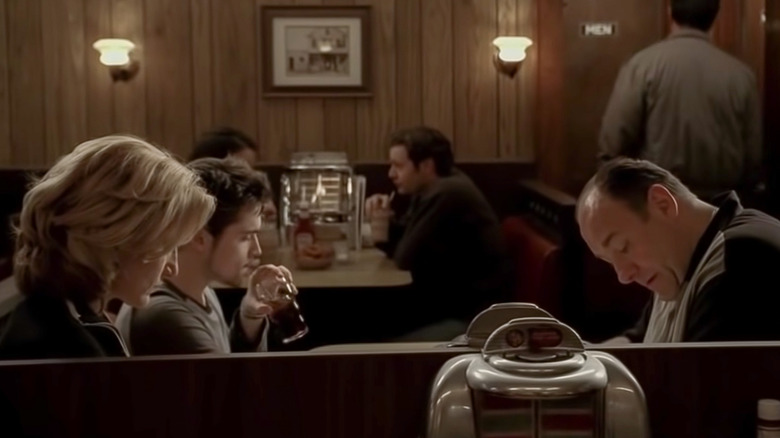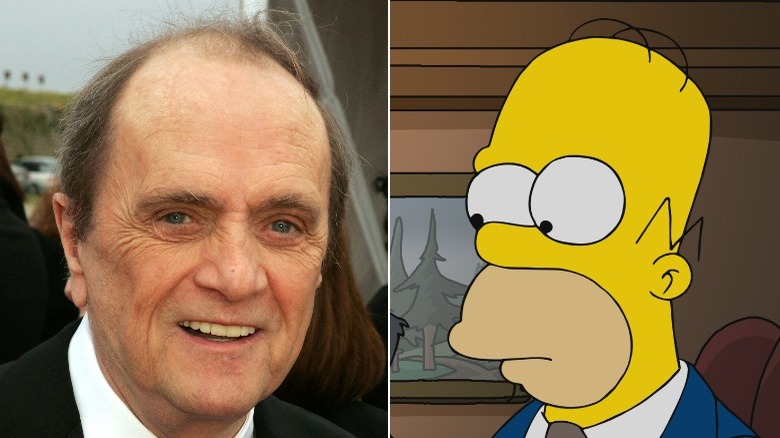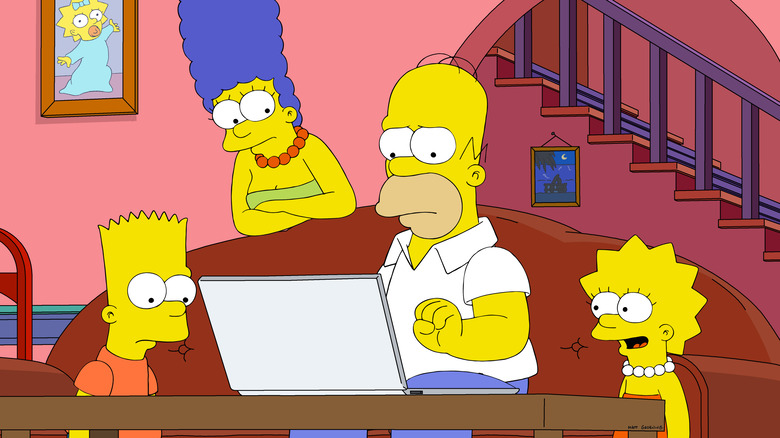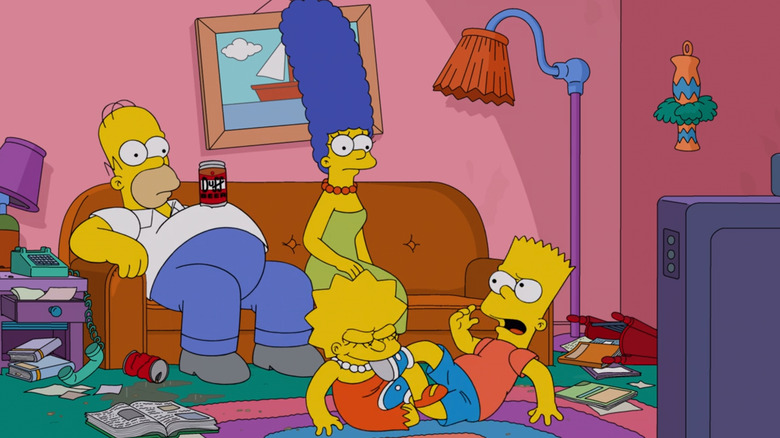Here's How The Simpsons Should Finally End
There's no denying that "The Simpsons" deserves its place among television's greatest series. The Guinness Book of Records has chronicled the show's long list of achievements and awards since it premiered in 1989, including marks for longest-running scripted series, most Emmy awards for an animated show, and most guest stars featured. Matt Zoller Seitz and Alan Sepinwall named it the best show ever in their book "TV: The Book," but in their effusive praise for the legendary series, they present what will be a problem when Matt Groening and the rest of "The Simpsons" creative team finally wrap up the saga of America's favorite yellow-skinned cartoon family.
"Summing up The Simpsons would be impossible," Seitz and Sepinwall wrote in an article published by Vulture. "The show has been on for far too long (so long that it now predates the existence of many of its viewers), done too many amazing things, and been through too many evolutions. That level of complexity has also created a storytelling environment that could bring Homer, Marge, Bart, Lisa, Maggie, and the rest of Springfield to any of a seemingly infinite range of fates. But regardless of the path Groening and company choose to get there and whatever else happens along the roadside, Homer's death will be the only appropriate way to punctuate "The Simpsons."
After so many close calls, Homer must die
As an Archie Bunker-style head of household, Homer (Dan Castellaneta) has always loomed largest over his family and is the true protagonist of "The Simpsons," so it's most fitting that his story end along with the show, like Walter White's (Bryan Cranston) at the conclusion of "Breaking Bad." In one of multiple twists on the theory, Reddit user u/hardtopickaname postulated that Homer has been in a coma since the early '90s, but producer Al Jean squashed that theory in 2015 (via The Independent). He has, however, had more close calls with death than most real humans could ever survive, so his appointment with the Grim Reaper is long overdue.
Over the years, Matt Groening and his Simpsons teams have both satirized and honored countless other shows. Wrapping up a series presents perhaps the most difficult challenge showrunners will face, and some finales are celebrated ("Breaking Bad," "Six Feet Under"), others debated ad infinitum ("The Sopranos," "Seinfeld"), and some are just plain flops ("Dexter," "Lost").
It's not hard to envision a finale to "The Simpsons" that tries to honor and skewer the best and worst of television's series finales. Most appropriate might be a poke at the ending of "The Sopranos" that takes us past when the screen went dark on Tony (James Gandolfini) and his family and shows Homer felled by an assassin's bullet, sausage lodged in his windpipe, or clumsy waiter with a tray full of steak knives.
Newhart set the bar for series endings, and The Simpsons could pay tribute to that
TVLine ranked the "Newhart" finale as the third best ever, and AARP's Chris Nashawaty put it in the top spot. "Newhart" wrapped with a marvelous treatment of the it-was-all-a-dream trope, with Bob Newhart's Vermont innkeeper taking a bop on the head and waking up in bed next to Suzanne Pleshette — who played his wife Emily Hartley on Newhart's previous hit series, "The Bob Newhart Show" — as he recounts the events of the entire "Newhart" series to his incredulous former TV wife.
Should "The Simpsons" choose to pay homage to the "Newhart" finale, Homer could take a similar blow to the head and wake up next to Pleshette (or Newhart), with the latter option giving viewers a chance to compare Homer and Bob's similar hairlines and skull shapes side by side. It's not a death in the corporal sense, but in that moment Homer Simpson would die just as "Newhart's" protagonist did when he became nothing more than a nighttime conjuring of Bob Hartley's subconscious.
Newhart has appeared as himself in Season 5, Episode 7 of "The Simpsons," "Bart The Fink," drawing the first half of the circle that could be weirdly completed with a "Newhart"-style series ending. The longest running sitcom in television history deserves a complete finish with an exclamation point at the end, or at least a period — but no "Sopranos" question marks.
The Simpsons have been stuck in a time loop since 1989
With a literal cast of thousands, it will be impossible to wrap all of Springfield's stories up in a single episode, even if Fox grants it an hour or more. We'll likely have to be satisfied with knowing the fates of the five members of the nuclear Simpson family unit, and Homer sits at the top of that modest and shaky pyramid, making his demise the perfect ending point for a series that by then may be well into its fourth decade on the air.
"The Simpsons" writers will also be challenged with fitting any kind of final character resolution into the show's static timeline where nobody ages. There have been occasional flash forwards and backwards to show Bart, Lisa, and Maggie as adults and Homer and Marge as seniors or the kids as babies and the parents as a young couple, but for the most part, the show has existed in the same repeating calendar year.
With none of the characters aware that they are in a time loop, a "Groundhog Day" ending where the protagonist finds a way to break it seems an impossible destination to get to. But Season 34, Episode 1, "Habeas Tortoise," focuses on Homer's burning desire to be smart and be regarded as such, providing a tiny opening for "The Simpsons" writing crew to make him the intellectual hero who cracks the show's timeline mystery. Such a breakout could also come to mean another pseudo-death like Bob Hartley's, where the Simpsons as we know them cease to exist because they were never truly real to begin with.
The Simpsons are based on Matt Groening's real family
The show is already a loop within a loop, based not so loosely on Matt Groening's upbringing — Homer and Margaret were his real-life parents and Maggie and Lisa his sisters. He told the New York Times in 2012 of the show's origin story, which is shocking to hear given the show's longevity. ”I was going to do the 'Life in Hell' characters," he said. "But then right before the meeting with Jim Brooks, I find out that whatever I did, Fox would own. So I made up the Simpsons 15 minutes before the meeting. I drew a family, and named them after my own family.”
Although he is also loosely based in part on the creator's brother Mark, that would make Bart the Matt Groening of the Simpsons, which could lead to a somewhat obvious reveal where the troublemaking youngster grows up to create a cartoon about his own clan. The Bart-as-creator story would be a nice pat wrap-up, but a show that zigs and zags as sharply as "The Simpsons" does couldn't possibly arrive at that predictable a destination. That ending also offers the opposite of finality: a never-ending loop where Simpsons beget Groenings who beget Simpsons and so on. "The Simpsons" deserve more finality from their finale, but whether it is a literal death or a metaphysical one, the only way to truly end the saga is by ending things for Homer.
